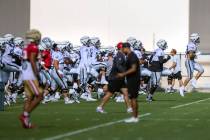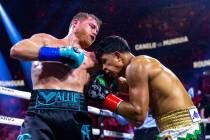AT WHAT COST: Players need more than athletic ability to stand out
Back when Paul Ratcliffe coached women's soccer at Saint Mary's, he received a videotape from a player in Medford, Ore., who wasn't on his recruiting radar.
It left little doubt he needed more information, and the more he learned, the more intrigued he became. Good thing, because Lucianne Crenshaw became a record-setting player while playing for the Gaels from 2000 to 2003.
The videos keep coming to Ratcliffe, who is entering his ninth season at Stanford, but they now more likely arrive in an emailed link to a short YouTube clip. He watches the videos to see if any featured players are worth following up.
"Usually, video for me piques my interest to see the player," Ratcliffe says. "I recruit nationally. ... It might help me want to see a kid in D.C."
The competition for athletic scholarships is fierce, and players can position themselves to catch the eyes of college coaches by participating on club and travel teams, and by reaching out to schools.
Athletes must be careful to distinguish themselves for the right reasons, however.
UNLV men's soccer coach Rich Ryerson recalls receiving an email that began: "Dear Coach Ryerson, the University of Denver has what I'm looking for."
But athletes need to do more than make sure their emails are mistake-free.
Ryerson pays special attention to messages that are specific. A reference to the soccer program should include a detail about the kind of system the program uses. And a mention of the academic program the athlete is interested in pursuing is especially important.
"It tells me a lot about a kid," Ryerson says. "It tells me they can do the homework necessary for college."
He also prefers letters and emails from players, not their parents, as it provides another hint at an athlete's real interest level.
While getting a coach's attention via email doesn't hurt, it's only part of the process.
Coaches carry long lists of prospective recruits, having seen many of them since the athletes were high school sophomores, or even freshmen, with names constantly added and deleted.
Recruiting services usually play a minor role, because coaches prefer to make their own evaluations, and some coaches are skeptical of such services.
Elite tournaments allow coaches a one-stop shop to see the top players -- and be seen by those athletes.
"Based on our recruiting, it's more efficient to go see tournament teams rather than high school teams," says Jennifer Klein, UNLV women's soccer coach. "We certainly budget to see as many kids as we possibly can."
With tightening budgets at UNLV and elsewhere around the country, that has become even more important.
It's not just about the money, though.
As UNR softball coach Matt Meuchel points out, attending the top tournaments also shows who the competition is looking at, because coaches are drawn from all over the country.
Coaches often have difficulty watching high school games because of the conflict with their own seasons.
"We rarely watch very many high school games," says Dixie State softball coach Randy Simkins. "I don't talk to a whole lot of high school coaches until we've identified a kid."
College coaches also must weigh the level of competition a prospect faces and the talent on the team for which the athlete is playing.
Ryerson says a talented goal keeper on a state championship high school team might go unnoticed because the defense in front of him is so good that player faces few shots. But the same player might make 25 saves in an elite tournament, exhibiting skills that weren't previously obvious.
Each sport is different, though, and many baseball camps advertise themselves as magnets for college recruiters.
UNLV baseball coach Tim Chambers says there is "too much of a push" for athletes in his sport to attend those camps.
"In a lot of cases, people spend a lot of money to send kids to these showcases and clinics for nothing," he said.
While coaches feel the pressure to evaluate younger and younger players, most say it's difficult to gauge how a high school freshman or sophomore will perform as a senior. Typically, scholarships are offered after a junior's season.
Coaches consistently stress character traits, and say it separates athletes of similar ability.
Dixie's Simkins remembers turning away one talented athlete after a disappointing recruiting trip: "We thought we did our homework on her. We found in a few hours it wouldn't work out. We knew she wouldn't mesh with the team. It wouldn't be a good fit. I think she knew it."
UNR swimming coach Mike Richmond uses a 101-point evaluation system, with 65 percent of it based on character. He begins each recruiting year with a list of more than 200 prospects, and uses his system to narrow it down to 18 he and his staff will try to land.
"For us, it's a very narrow focus," Richmond says. "We don't recruit 85 kids and sign 20 of them."
College coaches say athletes should try different sports, but most agree it is important to focus on one sport in high school.
UNLV's Chambers disagrees, however: "You find a lot of times that baseball players who were also football players are mentally tougher. They should enjoy the high school experience and play football and basketball and wrestle.
"I played five sports. You've got to experience it."
Contact reporter Mark Anderson at manderson
@reviewjournal.com or 702-387-2914. Follow him on Twitter: @markanderson65.























